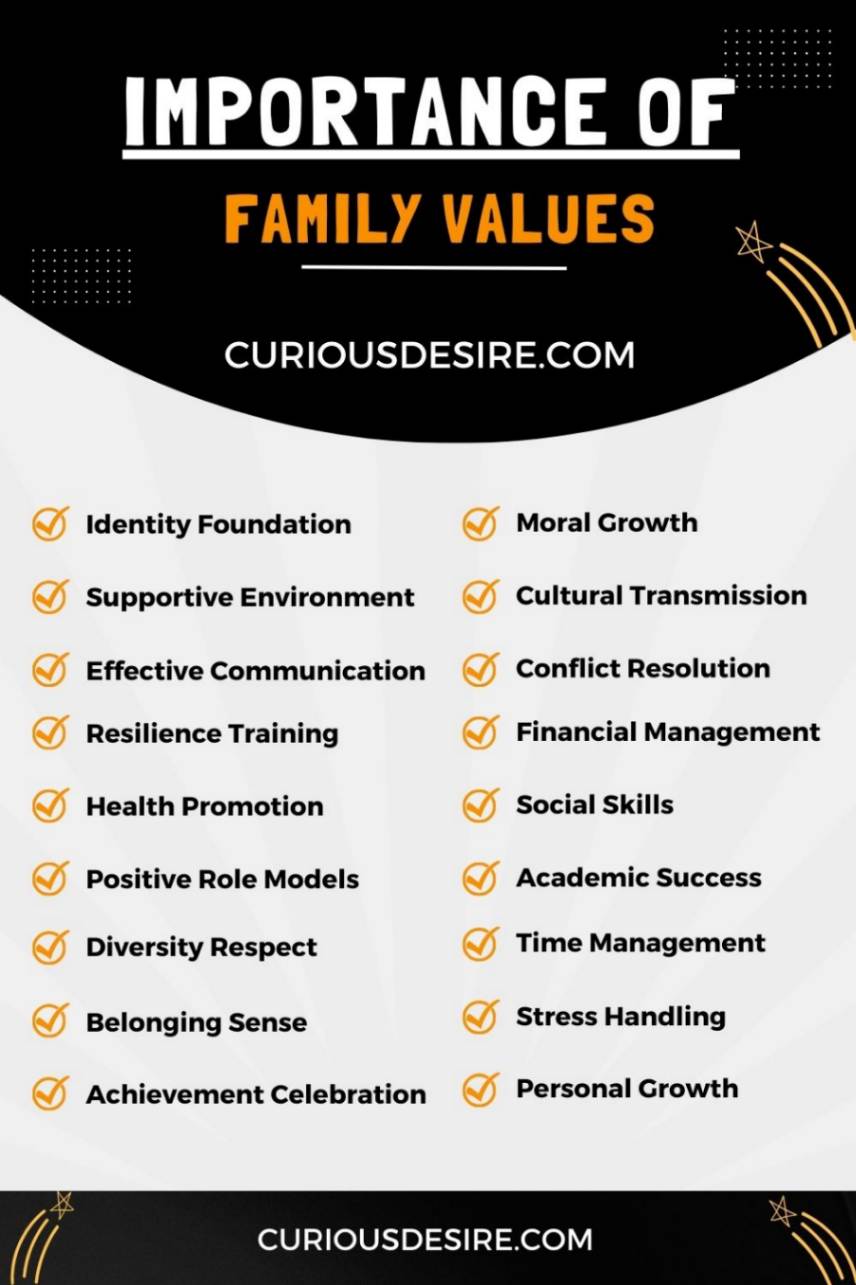Family values are the guiding principles and beliefs that shape the way families interact, communicate, and support each other.
They involve qualities such as love, respect, honesty, and empathy, which serve as the foundation for strong and healthy family relationships.
These values play an important role in shaping individual character, promoting a sense of belonging, and promoting overall well-being within the family unit.
In this article, we explore the importance of family values by exploring 20 key aspects that highlight their importance in nurturing happy, resilient, and harmonious families.
From conflict resolution to resilience building, each point illustrates how family values contribute to the fabric of family life and help cultivate meaningful connections that withstand the test of time.
Here are the 5 common reasons for the importance of family values:
- Emotional Support System
- Resilience Building
- Nurturing of Relationships
- Establishment of Boundaries
- Sense of Belonging
1. Foundation of Identity
Establishing a strong foundation of identity within the family is important because it forms the core of who we are as individuals.
For instance, in a family where cultural heritage is celebrated and shared, children grow up understanding their roots, traditions, and values. The following are its benefits:
- Self-Understanding: It helps family members understand their uniqueness, strengths, and weaknesses.
- Confidence Boost: Having a clear sense of identity boosts confidence and self-esteem.
- Resilience: Individuals with a strong sense of identity are better equipped to navigate challenges and setbacks.
- Healthy Relationships: It promotes healthier relationships as individuals are more aware of their needs and boundaries.
This knowledge forms a significant part of their identity, shaping how they perceive themselves and interact with others.
By prioritizing the development of individual identity, families teach the value of self-awareness, acceptance, and respect for diversity. This, in turn, promotes a deeper understanding and appreciation of family values such as acceptance, empathy, and inclusivity.
2. Emotional Support System
Having an emotional support system within the family is important for individuals to handle life’s challenges with resilience and stability.
Families offer a safe space where members can freely express their feelings, seek comfort, and find solace during difficult times.
This support promotes emotional well-being, strengthens bonds between family members, and develops the value of compassion and empathy.
For instance, when a family member loses a job, the rest of the family rallying around with words of encouragement and practical help demonstrates the importance of solidarity and care.
Through such experiences, individuals learn the significance of being there for one another, thereby nurturing a core family value of support and empathy.
3. Moral and Ethical Development
Family plays a fundamental role in shaping an individual’s moral compass and ethical principles.
Through daily interactions, discussions, and observed behaviors, family members impart values such as honesty, integrity, and responsibility.
These values serve as guiding principles in making decisions and managing relationships beyond the family unit.
For example, parents teaching their children the importance of telling the truth even when it’s difficult lays the groundwork for honesty and trustworthiness.
By consistently highlighting moral conduct, families contribute to the development of individuals who uphold ethical standards, thereby perpetuating vital family values across generations.
4. Transmission of Cultural Heritage
Preserving and passing down cultural heritage within the family is essential for fostering a sense of belonging and identity.
Family rituals, traditions, and stories serve as vehicles for transmitting cultural values, beliefs, and practices from one generation to the next.
By participating in cultural celebrations, preparing traditional meals, or recounting ancestral narratives, family members not only connect with their heritage but also reinforce its significance.
For instance, grandparents sharing tales of their homeland with grandchildren instills pride in cultural roots and strengthens family bonds.
Through these experiences, individuals learn to appreciate diversity, honor their heritage, and uphold cultural values, thus perpetuating the rich tapestry of family heritage.
5. Communication Skills
Effective communication is vital for building strong relationships and resolving conflicts within the family.
It serves as the cornerstone of healthy interactions, allowing individuals to express their thoughts, feelings, and needs clearly and respectfully. Benefits include:
- Promotes understanding and empathy among family members, fostering closer connections.
- Facilitates smoother resolution of conflicts by encouraging open dialogue and active listening.
- Strengthens family bonds through meaningful conversations and shared experiences.
However, in a family where communication is valued, members openly express their thoughts and emotions, leading to greater harmony and mutual support.
This, in turn, helps cultivate stronger relationships and strengthen the value of understanding and empathy within the family unit.
6. Conflict Resolution
Another important aspect of family dynamics is conflict resolution, which plays a pivotal role in promoting unity and understanding among its members.
When families handle disagreements with respect and empathy, it creates an atmosphere conducive to healthy relationships.
Addressing conflicts constructively not only eases tensions but also promotes better communication and collaboration within the family.
For example, when parents guide their children through disputes, they teach them the value of compromise and working together.
Through such experiences, families highlight the importance of mutual respect and teamwork, nurturing essential conflict-resolution skills that benefit everyone involved.
7. Financial Responsibility
Financial responsibility is a cornerstone of family stability and security, ensuring long-term well-being through prudent resource management and informed decision-making.
By prioritizing financial responsibility, families can achieve stability, reduce stress, and develop disciplined spending habits.
For instance, involving children in discussions about household budgets teaches them important lessons about wise money management and planning for the future.
Through these experiences, families highlight the significance of being careful with money and thinking ahead, empowering individuals to make sound financial choices and secure their financial future.
8. Socialization and Interpersonal Skills
Embedded within family interactions are socialization and interpersonal skills, important for handling relationships beyond the household.
Within the family, individuals learn how to communicate effectively, cooperate, and empathize with others. Engaging in shared activities provides opportunities for practicing these skills and strengthening familial bonds.
For example, during family gatherings or game nights, children learn how to take turns and share, important skills for getting along with others.
Through these experiences, families highlight the importance of empathy, communication, and teamwork, preparing individuals for positive interactions in wider social contexts.
9. Resilience Building
At the heart of family resilience lies the ability to bounce back from adversity, forging mental and emotional strength essential for overcoming life’s challenges.
By offering support and encouragement during difficult times, families nurture optimism, perseverance, and unity.
For example, families facing hardship come together, offering comfort and brainstorming solutions as a team.
Through these shared experiences, families impart resilience, perseverance, and mutual support, promoting a culture of strength and solidarity within the family unit.
10. Health and Well-being Promotion
In the realm of family life, the promotion of health and well-being stands as a cornerstone for promoting vitality and happiness among its members.
This involves creating an environment that supports physical, mental, and emotional wellness through various means:
- Nutritious Meals: Providing balanced and wholesome meals that nourish the body and support overall health.
- Regular Exercise: Engaging in physical activities together as a family to promote fitness and well-being.
- Emotional Support: Offering empathy, understanding, and encouragement to each family member to address emotional needs.
- Stress Management Techniques: Implementing strategies such as mindfulness, relaxation exercises, or hobbies to reduce stress and promote mental well-being.
For example, families may engage in physical activities together like hiking or cooking nutritious meals as a group, strengthening the importance of staying active and eating well.
Through such practices, families not only enhance their physical health but also strengthen their emotional bonds and resilience, ultimately promoting a positive and thriving family environment.
11. Education and Academic Success
Promoting education and academic success within families is important for empowering individuals to reach their full potential and contribute meaningfully to society.
By prioritizing education, families provide opportunities for intellectual growth and personal development. Achieving academic success opens doors to future opportunities and develops a lifelong love of learning.
For example, parents who actively support their children’s education by assisting with homework and encouraging participation in extracurricular activities demonstrate the value of lifelong learning.
Through such actions, families strengthen the importance of education as a pathway to personal and professional fulfillment, nurturing a culture of academic excellence within the family unit.
12. Role Modeling for Future Generations
Serving as role models for future generations is important within families to impart values, attitudes, and behaviors that shape character and guide ethical decision-making.
By modeling positive traits and demonstrating integrity, parents set examples for their children to emulate. Role modeling promotes respect, empathy, and responsibility, laying the groundwork for ethical leadership and citizenship.
For instance, parents who exhibit honesty and compassion in their interactions with others teach their children the importance of integrity and kindness.
Through consistent modeling of desirable behaviors, families develop essential values and contribute to the development of morally upright individuals who positively impact society.
13. Time Management
Effective time management is paramount within families to optimize productivity, reduce stress, and foster work-life balance.
By allocating time efficiently to various tasks and responsibilities, families create opportunities for quality time together and personal growth.
Developing time management skills equips individuals with the ability to prioritize tasks, meet deadlines, and maintain a sense of control over their lives.
For example, families that establish routines and schedules for daily activities teach children the value of organization and time discipline.
Through such practices, families cultivate a culture of responsibility and accountability, allowing members to make the most of their time and achieve their goals.
14. Respect for Diversity
Promoting respect for diversity within families is essential for promoting inclusivity, empathy, and understanding in an increasingly multicultural society.
By embracing differences in race, ethnicity, culture, religion, and beliefs, families cultivate an environment of acceptance and appreciation for individual uniqueness.
Respect for diversity promotes empathy and reduces prejudice and cooperation among family members and beyond.
For instance, families that celebrate diverse holidays, cuisines, and traditions demonstrate openness and respect for different cultural backgrounds.
Through exposure to diverse perspectives and experiences, families nurture a sense of belonging and unity, reinforcing the value of inclusivity and respect for all individuals.
15. Stress Management
Effective stress management is important within families to promote well-being, harmony, and resilience in the face of life’s challenges.
By adopting strategies to cope with stressors, families can reduce tension, improve communication, and strengthen familial bonds.
Managing stress effectively enhances mental and emotional health, promotes a positive family atmosphere, and encourages healthy coping mechanisms.
For example, families may engage in relaxation techniques together, such as deep breathing exercises or mindfulness practices, to alleviate stress and promote relaxation.
Through such practices, families cultivate resilience and create a supportive environment where members can thrive amidst life’s pressures.
16. Nurturing of Relationships
Nurturing relationships within families is fundamental for promoting trust, intimacy, and mutual support among its members.
By investing time and effort into building strong connections, families create a sense of closeness and belonging that enriches their lives.
Nurturing relationships involves active listening, empathy, and meaningful communication to deepen emotional bonds and strengthen familial ties.
For example, regular family dinners or outings provide opportunities for quality time together, promoting shared experiences and memories.
Through such activities, families demonstrate the value of prioritizing relationships and creating a foundation of love and support that sustains them through life’s ups and downs.
17. Establishment of Boundaries
Establishing boundaries within families is important for maintaining respect, autonomy, and healthy relationships among its members.
Boundaries delineate individual rights, responsibilities, and personal space, ensuring that everyone feels safe and valued within the family unit.
Clear boundaries promote open communication, mutual understanding, and conflict resolution, creating a harmonious family environment.
For example, setting limits on screen time or personal belongings teaches children the importance of respecting others’ boundaries.
Through consistent reinforcement of boundaries, families cultivate respect, trust, and cooperation, promoting a sense of security and well-being for all members.
18. Promoting a Sense of Belonging
Creating a sense of belonging within families is important for nurturing identity, self-esteem, and emotional well-being among its members.
By promoting an inclusive and supportive environment, families provide a foundation of acceptance and belonging that strengthens individual and collective resilience.
Promoting a sense of belonging involves valuing each member’s contributions, celebrating achievements, and offering unconditional love and support.
For example, families may establish traditions or rituals that strengthen their shared identity and bond, such as annual family reunions or holiday traditions.
Through such practices, families affirm their interconnectedness and create a nurturing space where every member feels valued, accepted, and cherished.
19. Personal Growth and Development
Personal growth and development within families are essential for promoting individual potential, self-awareness, and fulfillment.
By encouraging exploration, learning, and self-improvement, families create opportunities for members to discover their strengths, passions, and aspirations.
Families support this process by providing encouragement, guidance, and resources to facilitate growth. For example:
- Encouraging children to pursue hobbies and interests that spark their curiosity and creativity.
- Providing opportunities for family members to learn new skills or pursue further education.
- Offering constructive feedback and support to individuals as they navigate personal challenges and setbacks.
Through these experiences, families cultivate a culture of lifelong learning and personal development, empowering individuals to realize their full potential and lead fulfilling lives.
20. Celebration of Achievements and Milestones
Within families, celebrating achievements and milestones is like planting seeds of happiness and pride. It’s about recognizing the special moments—big or small—that make each family member unique and valued.
From a child’s first bike ride to a parent’s promotion at work, these celebrations bring smiles, cheers, and warm embraces.
They remind everyone that their efforts and successes are appreciated and celebrated by those who matter most.
Through these simple acts of recognition and joy, families create bonds that grow stronger with each shared milestone, weaving a tapestry of love and support that lasts a lifetime.
Conclusion
In conclusion, family values form the bedrock of happy and thriving families. By embodying qualities such as love, respect, and support, these values create a nurturing environment where individuals can grow, learn, and flourish.
Through the exploration of 20 important aspects, we’ve seen how family values contribute to the strength of familial bonds, the well-being of its members, and the resilience in times of adversity.
By upholding these values, families can build strong foundations that endure, promoting a sense of belonging and unity that enriches lives and creates lasting memories for generations to come.
Importance of Family Values FAQs
1. What are family values, and why are they important?
Family values are beliefs and principles that guide how families interact and support each other. They’re important because they create a loving and respectful environment where individuals can thrive and relationships can flourish.
2. How do family values contribute to the well-being of family members?
Family values promote emotional support, communication, and understanding among family members, leading to greater happiness and fulfillment in life.
3. What role do family values play in resolving conflicts within the family?
Family values teach important conflict resolution skills such as empathy, compromise, and forgiveness, helping family members navigate disagreements and strengthen their relationships.
4. How can families instill and reinforce positive values in children?
Families can instill positive values in children through role modeling, open communication, and consistent reinforcement of desired behaviors, helping them develop into responsible and compassionate individuals.
5. How do family values contribute to the resilience of families in challenging times?
Family values provide a supportive framework that helps families withstand adversity by promoting unity, mutual support, and problem-solving skills during difficult times.
6. What impact do family values have on the overall cohesion and unity of the family?
Family values foster a sense of belonging and unity among family members, strengthening familial bonds and creating a supportive environment where everyone feels valued and appreciated.
7. How do cultural and societal influences shape family values?
Cultural and societal influences play a significant role in shaping family values by providing norms, traditions, and expectations that guide family interactions and behaviors.
8. Can family values evolve, and how does this impact family dynamics?
Family values can evolve as societal norms change and family members grow and develop. This evolution can impact family dynamics by influencing communication styles, priorities, and relationships within the family unit.


